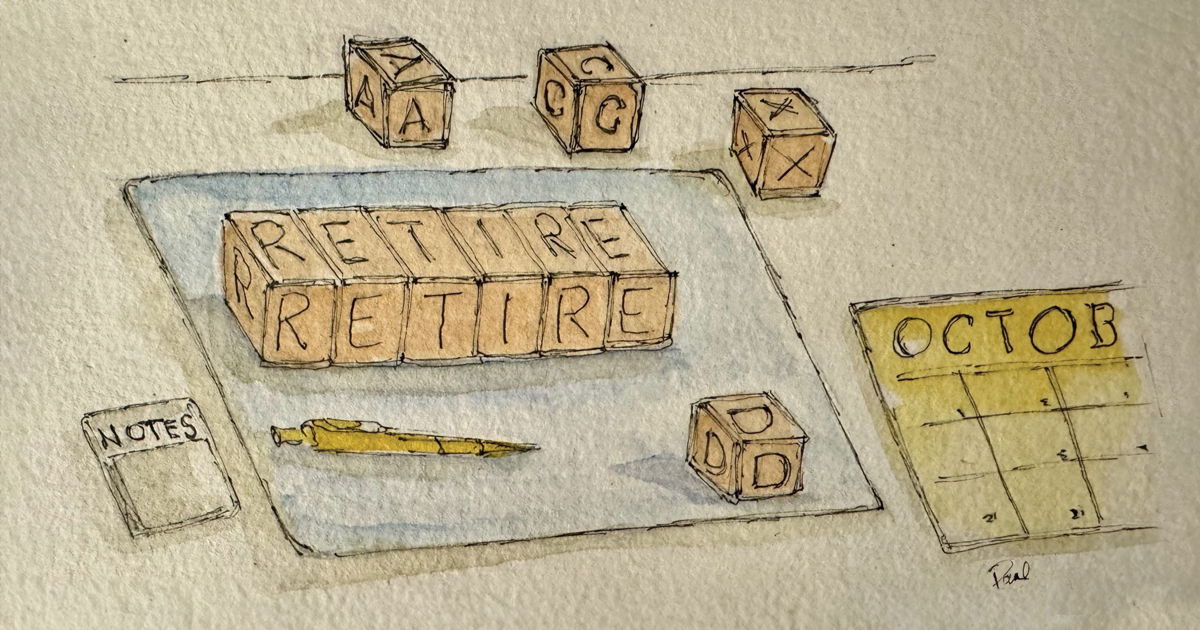
By Paul M. Floyd
Sooner or later, all practicing lawyers face the inevitable question: “Should I stop practicing law and do something else with my time?” For some, the question arises in our 30s or 40s. For others, it comes in their 60s and 70s. For still others, it comes up repeatedly every 7-10 years. In short, the question of retirement is not just for the older or senior attorney but one for each of us to reflect on throughout our careers.
Following both of my law partners’ recent retirements, questions about my own retirement plans have naturally surfaced, making the topic not only timely but deeply relevant to my personal and professional life.
Fortunately, in my law practice I regularly advise and represent numerous attorneys who are at or near the age when many consider retiring. When the topic comes up, their responses fall into three categories:
- I will never retire. I can’t see myself doing anything else. Dying in court or at my desk is the way I want to go. Can you make sure the firm’s partnership agreement has no set retirement age?
- I must retire now and I mean now. This minute, not tomorrow, not in a few weeks. Now. I am done. Can you help me notify my clients and help them find another attorney?
- The firm says I need to retire now, but I would like to transition my practice for another five or so years. Can you help me work through the next season of my law practice?
Each of these responses raises its own set of concerns.
The “I’ll never retire” attorney
While this response may sound magnanimous to some and a nightmare to others, not planning for one’s transition out of the practice of law is naïve and short-sighted. Be honest: After one turns 60, all bets are off regarding one’s good health. An unexpected stroke, cancer, heart attack, long-term illness, Parkinson’s disease, dementia, or plain poor health can strike any of us, bringing an end to practicing law. Less expected, but just as real, is that a lawyer may become the primary caregiver for a loved one with a debilitating illness, which can also end a law practice. Not planning for retirement just leaves the burden of closing down your practice to law partners and family members. Avoiding discussion of the hard issues surrounding planning for your retirement may be the path of least resistance in the short term but carries a high risk in the long term. Hope is not a strategy. This is not an ideal way to consider how and why to retire.
The “I have to retire right now” attorney
Pre-covid, a middle-aged attorney who had practiced over 20 years met with me and declared that, given his current mental state (in large part exacerbated by the pressures of his practice), he needed to quit practicing law immediately. When I asked him to clarify his timing, he said that he had just left his therapist’s office, and upon the therapist’s sound advice, he needed to retire right now. Fortunately, he brought along his senior associate, who was capable and willing to step in and continue representation of his clients; I advised them about the transition. What I remember most about that occasion was the palpable change in the client’s physical posture, words, mood, and emotional state from the time he entered my office to the time he left. He clearly had struggled with the demons of his law practice but for any number of reasons could not until that day let go. This is also not an ideal way to consider how and when to retire, because he had clearly lived unhappily for many years until he broke.
The “I am planning for retirement” attorney
For most of us, thoughts about when and how to retire evolve throughout our practice and help to shape each lawyer’s formal (or more likely informal) plan for retirement, as it should. No matter how many years you have been practicing law, planning for retirement will help your eventual move to be less of a chaotic and disruptive surprise to you, your law partners, and your family. Hopefully, this will allow you to retire more on your terms than on the terms of your law partners or your mental or physical health.
The MSBA has a number of succession planning resources. (You were wondering where this was all going, right?) One such tool is the Minnesota Lawyers Mutual (MLM) booklet “Succession Planning,” available to members on the Law Practice Management page of the MSBA website (www.mnbar.org/succession). There is also an On-Demand MSBA CLE entitled “Successful Succession: Make a Plan for Your Firm.” And there are several trained coaches, capable of guiding you through the process, who advertise in the classified section of Bench & Bar.
In addition, all lawyers who have been admitted to practice before the Minnesota Supreme Court for at least 37 years or are over 62 years old are automatically enrolled in the MSBA’s Senior Lawyers & Judges Section, which regularly meets to discuss navigating the before, during, and after questions of retirement. As more and more of us retire from the practice, being active with other senior attorneys and judges from the profession is a viable and helpful option.
So the next time you hear a lawyer say they will never retire, kindly remind them that they will save everyone a lot of grief if they plan ahead for retirement.
 Paul M. Floyd is one of the founding partners of Wallen-Friedman & Floyd, PA, a business and litigation boutique law firm located in Minneapolis. Paul has been the president of the HCBA, HCBF, and the Minnesota Chapter of the Federal Bar Association. He lives with his wife, Donna, in Roseville, along with their two cats.
Paul M. Floyd is one of the founding partners of Wallen-Friedman & Floyd, PA, a business and litigation boutique law firm located in Minneapolis. Paul has been the president of the HCBA, HCBF, and the Minnesota Chapter of the Federal Bar Association. He lives with his wife, Donna, in Roseville, along with their two cats.